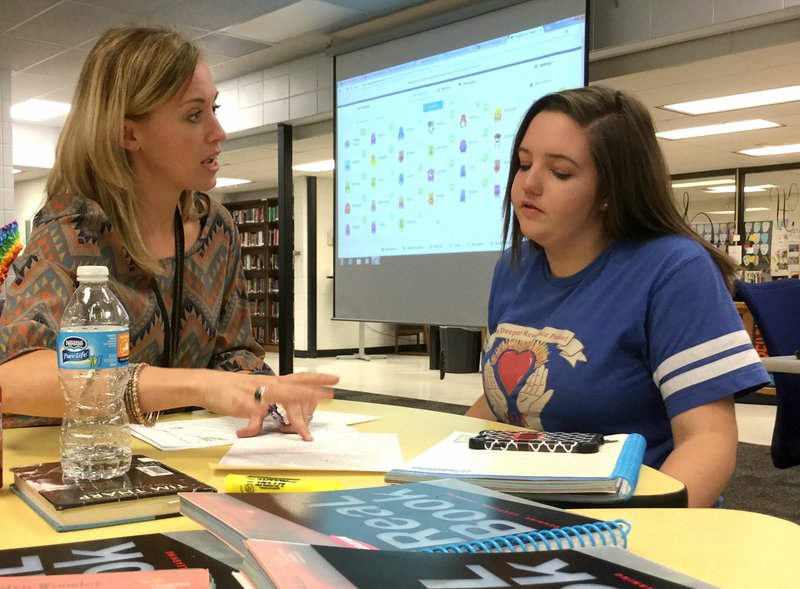BENTONVILLE -- Principals of two junior high schools said they've already seen improved academic results from after-school programs launched in January.
Both programs provide students extra help in literacy and math in small groups overseen by teachers. There's also time for fun activities and socializing. The programs are ROAR at Washington Junior High and the HUB at Lincoln Junior High.
Lincoln Junior High sought students for the program who were close to attaining proficiency in literacy and math and needed some intervention to get them there, said Don Hoover, principal.
"We're seeing some great gains for all kids," Hoover said. "Report cards just came out. Those kids had marks they've never had before."
Perhaps just as important is the students involved in both programs have found a way to connect to school that excites them, he said.
"They weren't involved in maybe a sport program or a fine arts program," Hoover said while addressing the School Board on Monday. "They have found a love and a passion being with this small group of students, in that small setting where they can really get to know their teacher, get to know their peers a little better, have some fun, but also work toward their own individual achievement and success."
Research has linked academic learning to kids' emotions and how they feel about school, said Tim Sparacino, Washington Junior High's principal. He referred to a study showing the percentage of students who love school gradually drops from a high of 95 percent in kindergarten to a low of 37 percent in the ninth grade.
"As much as we're trying to elevate academic achievement, we're also trying to make sure we connect those kids to school, make them want to be there," Sparacino said.
'It has to be fun'
Washington Junior High's program runs Tuesday through Thursday. Average attendance is 45, according to Briana Rentschler, program coordinator.
ROAR, or Relationships, Opportunities, Adventures and Readiness, is modeled after Bentonville High School's ROAR program, which began in September.
Camden Sandlin, 13, is a seventh-grader at Washington. He's been a part of ROAR since it began.
"I've been getting my work done," Camden said. It helps him get ahead and avoid a bad grade, he said, adding his grades have improved.
Camden used time Wednesday to work on a multimedia science project about wild boars.
Teachers can tell the ROAR staff what a student needs, which could include specific skill reinforcement or help completing a homework assignment.
Survival was the theme last week. Students heard a presentation by school nurse Jennifer Haddinger on first-aid. Bentley Fisher, an English teacher, gave a demonstration on how to start a fire in the wild.
The kids have played dodgeball, done science experiments and a papier-mache project. Those kinds of activities differentiate the program from the regular school day, Rentschler said.
"We can't ask kids to come in after school and do more school," he said. "It's not going to work. It has to be fun."
Staff members targeted specific students before opening the program to others, inviting them to fill out an application to join, Rentschler said.
Their 'place to shine'
Lincoln Junior High's HUB -- short for Helping Understand Better -- meets Monday, Wednesday and Thursday. Average attendance is 35.
Students come to the "learning center," formerly known as the school library, and get some snacks and time to relax.
"After a little time with friends, we get them right to work," Hoover said.
Two seventh-graders worked with English teacher Cristina Cox on Thursday on essays about Shirley Jackson's short story The Lottery. A few other students seated around another table played word games.
The ratio of students to adults in the room typically is five to one. The program welcomes high school students who serve as tutors, Hoover said.
Arlene Wise, program coordinator, said a trip to Silver Dollar City in Branson, Mo., is planned for the end of the school year for those with the best participation rates in the program.
Students are typically those who hesitate to raise their hands in class because they don't consider themselves to be as smart as some of their classmates, Wise said. The after-school program has given them "their little place to shine," she said.
The increased confidence shows in their regular school day, Hoover said.
Cynthia Weston, an eighth-grade math teacher, said HUB has made a big difference in the performance and attitude of one of her students. The boy was at best a C student, but his third-quarter grade was an 81 percent, which qualifies as a B, she said.
"He also does not have any problems sharing his work, whereas before, he would always be hesitant about sharing," she said.
Paying for it
Both schools are using federal Title I money to pay the biggest expenses involved in the programs, including materials and the teachers' time. Title I money is meant for schools with high numbers of children from low-income families.
Private money -- much of it from teachers' pockets -- also goes into the programs to pay for snacks and occasional field trips, Hoover said.
Joe Quinn, a School Board member, was sorry to hear teachers are paying to prop up the programs. He said it makes him feel like board members are not doing their job.
"Could we budget this a little differently and at least find some funding for the snacks and some things like that?" Quinn said at Monday's board meeting. "I don't think that's an unreasonable ask. This is one of the best things this district does. Let's help them pay for it."
Chris DeWitt, the School District's transportation director, found money in his department's budget to provide busing for students who need a ride home when the programs wrap up at 5:30 p.m.
Sparacino said he and Hoover are "greatly appreciative" of the transportation department's support.
NW News on 04/10/2017

